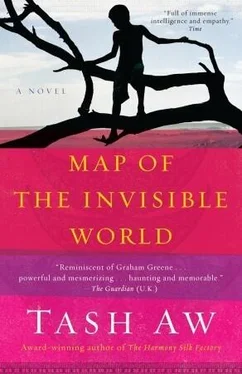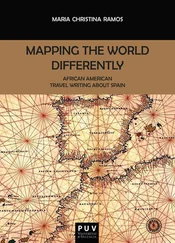Tash Aw - Map of the Invisible World
Здесь есть возможность читать онлайн «Tash Aw - Map of the Invisible World» — ознакомительный отрывок электронной книги совершенно бесплатно, а после прочтения отрывка купить полную версию. В некоторых случаях можно слушать аудио, скачать через торрент в формате fb2 и присутствует краткое содержание. Год выпуска: 2010, Издательство: Spiegel & Grau, Жанр: Современная проза, на английском языке. Описание произведения, (предисловие) а так же отзывы посетителей доступны на портале библиотеки ЛибКат.
- Название:Map of the Invisible World
- Автор:
- Издательство:Spiegel & Grau
- Жанр:
- Год:2010
- ISBN:нет данных
- Рейтинг книги:4 / 5. Голосов: 1
-
Избранное:Добавить в избранное
- Отзывы:
-
Ваша оценка:
- 80
- 1
- 2
- 3
- 4
- 5
Map of the Invisible World: краткое содержание, описание и аннотация
Предлагаем к чтению аннотацию, описание, краткое содержание или предисловие (зависит от того, что написал сам автор книги «Map of the Invisible World»). Если вы не нашли необходимую информацию о книге — напишите в комментариях, мы постараемся отыскать её.
comes an enthralling novel that evokes an exotic yet turbulent place and time—1960s Indonesia during President Sukarno’s drive to purge the country of its colonial past. A page-turning story,
follows the journeys of two brothers and an American woman who are indelibly marked by the past — and swept up in the tides of history.
Map of the Invisible World — читать онлайн ознакомительный отрывок
Ниже представлен текст книги, разбитый по страницам. Система сохранения места последней прочитанной страницы, позволяет с удобством читать онлайн бесплатно книгу «Map of the Invisible World», без необходимости каждый раз заново искать на чём Вы остановились. Поставьте закладку, и сможете в любой момент перейти на страницу, на которой закончили чтение.
Интервал:
Закладка:
As the Buick swept through the neighborhood, past the high walls that surrounded the mansions, Adam began to recognize the style of the buildings: Western, massive, a touch bizarre. A motorbike lying by the side of the road, its wheels twisted and crushed. He had seen this place before and he knew they were going to Zubaidah’s house.
They drove through ornate wrought-iron gates painted with touches of gold paint; they drew up alongside a sports car that Adam did not recognize. The house seemed even bigger than he remembered. The front doors were made of heavy, dark timber, their veneer reflecting the light cast by the car’s headlights.
“Margaret, thank god you made it,” Bill said, running to meet her. He reached out to her and held her elbow as if to reassure himself that she was really there. “There was a demonstration outside the embassy that’s carried on into the night. Those guys were lighting fires — it was getting very tense out there, so I thought you should come here. It isn’t safe around the embassy. The paperwork’s done. You can be in Singapore by lunchtime tomorrow.”
“This is Zubaidah’s place, isn’t it?”
“Her father’s, yes. How’s the boy doing?”
“Okay, I think.”
“We got him, Margaret,” Bill said, his voice dropping almost to a whisper. “We got him.”
Margaret felt a sudden tensing in her chest, a rush of blood to her temples.
“Well, actually, the girl found him,” said Bill, carrying Adam’s bag into the house. “Come on, we need to hurry.”
Adam ran up the steps ahead of Margaret and Bill. He rushed into the hallway and paused briefly at the foot of the great, sweeping staircase. Z emerged from her bedroom; she was wearing pajamas and her hair was down. She looked more childlike than Adam remembered. He started toward her but she was pointing at a spot behind him. He stopped and turned around. At the threshold of a door off the hallway, Karl was standing looking up at Adam. He held on to both sides of the door frame, supporting himself as he tried to smile. He coughed — a heavy, dry spasm.
Margaret said, “Good god.”
“Bapak,” Adam cried. But his voice seemed to choke even as he called out to Karl and he could say no more. He ran down the stairs and eased Karl’s arm over his shoulder so that he could support him. He helped him back into the room and laid him down on the sofa. He had never realized how small and light his father was; perhaps they were both small and light in this enormous house in this enormous city. Adam covered Karl with a blanket that Z had given him.
“Margaret,” Bill whispered, “I know he’s ill and weak, but if you want to get out of this place I’d advise you do it now . I’ve got papers for him too. All of you.”
“Out of the question, Bill. Look at him.”
They made Karl drink as much water as he could. Margaret boiled some rice porridge and made sure he ate two bowls of it. She remembered how, when she was a child in Bali — just before she had met Karl — she had fallen ill with malaria and her mother had fed her rice porridge. It was something all Asians ate when they were ill, her mother had said; the body can’t deal with anything more when it is in distress. Margaret did not know why she remembered exactly how her mother had done this, and why she now had no hesitation in preparing this food for Karl. It was as though she had been doing it her whole life.
Adam stayed with Karl, holding his hand until he drifted off to sleep. Margaret and Bill left the room and Adam could hear them arguing outside. They were trying to keep their voices down, and although Adam could not quite hear what they were saying, he understood the gist of their conversation. It did not matter to him now whether he left this country or not. All that mattered was that he was not separated from his father.
“Quite against my principles,” explained Z later, “I went to see my dad. Adam told me about the search for his foster father and it’s no secret that my dad has — oh, I hate saying this word— connections . I don’t even like thinking about it; it makes me ashamed. But I had no choice. It’s the only way to get things done quickly. In this country you could say it’s the only way to get things done.”
“Yes,” said Bill, “I know about your father. He’s very friendly with the president.”
“I don’t know how far their friendship extends, but they help each other out in one way or another — mostly financially. They were schoolmates in Surabaya, you see. So he put in a call to the president — a personal instruction from the president carries much weight, as you can imagine. They found Mr. de Willigen at once. It seems he was to have been repatriated — mistakenly, they claim — but then he fell ill and had to be moved from one hospital to another. Police bureaucracy isn’t very efficient.”
“It was a very brave and generous thing for you to do,” said Margaret, “and I hope your father didn’t mind too much.”
Z shrugged. “He didn’t seem too concerned. He was quite preoccupied with something else — a painting, I think, something the president has asked him to finance. My dad was being quite grumpy about it, says he’s been paying for too many of the president’s personal luxuries recently. I think the president is getting more and more extravagant. Apparently this painting is huge and has lions and tigers in it, and Dad can’t really afford it, but what can he do? He still needs the president to help him with his business — or whatever they do together. I never ask too many questions; I don’t want to know about all that sordid business.”
Margaret smiled. “I bet it’s some painting,” she said. “Thank you nonetheless. I know it must have been difficult for you.”
Z paused awhile, gazing absently at the ceiling. She smiled weakly. “It’s funny. I always swore I would never ask for his help, that I would be independent and do whatever I pleased. But now that I’ve done it, well, it doesn’t seem so bad. It feels quite, I don’t know, normal . I guess I’ll just have to live with it.”
“Terrible, isn’t it, how that happens.” Margaret laughed. “The way things suddenly become acceptable.”
Z nibbled at her fingernails, frowning. “Problem is, it feels more than acceptable, it feels almost nice.” She looked at Adam and put her free hand out to him. He clasped it with both hands but did not say anything.
33
W here are you going, Johan?” Adam called out. “Wait for me.”
Johan was some ways ahead and Adam struggled to keep up, for Johan was stronger and taller than he was. They were a long way from the orphanage now, in the low, rocky hills that lay between the orphanage and the sea, sheltered by trees that would never grow very tall because of the brine and the poor, sandy soil. In the dark Adam could not see Johan’s face clearly, not even when he finally caught up with him.
“Go back, Adam, you shouldn’t have followed me.”
“But what are you doing? We aren’t allowed here. We should be asleep.”
“I know. That’s why you should have stayed in bed.”
“I couldn’t sleep. I’m excited about tomorrow.”
Johan did not reply. All Adam could hear was the sea breeze that had picked up a little; it carried the sound of the water beyond, and suddenly the sea seemed close by, attainable. Johan sighed. “Idiot,” he said, but he did not sound angry. “Come on, it’s not far.”
They stumbled over rough ground, their ankles scraping against rocks. Ahead of them they could hear the foamy rush of the retreating tide, the froth and pull of the waves on the shore; and underfoot they could feel the thorny grass giving way to sandier ground. But still the sea remained out of sight, beyond a screen of scrubby bushes and a thick barrier of rocks. There was light in the night sky, enough to make out the thin tidal rivulets that snaked toward the sea; but when Adam and Johan looked up at the sky they saw it was shrouded in cloud and they could not tell where the moon was. They reached the foot of a mound of sharp volcanic rock that was silvery with brine. Johan went first, picking his way nimbly amid boulders that were powdery to the touch. Sometimes loose shards fell away beneath his feet, but he was quick and sure and did not slow down. From time to time he would stop and wait for Adam, reaching out to guide him and make sure he did not fall. He did not like it when Adam fell. But the sea was close by now, and Johan and Adam could smell the freshness of the breeze and hear the rumble of the waves that grew louder as they scrambled up the slope; even when they slipped they did not feel the sharpness of the rocks underfoot.
Читать дальшеИнтервал:
Закладка:
Похожие книги на «Map of the Invisible World»
Представляем Вашему вниманию похожие книги на «Map of the Invisible World» списком для выбора. Мы отобрали схожую по названию и смыслу литературу в надежде предоставить читателям больше вариантов отыскать новые, интересные, ещё непрочитанные произведения.
Обсуждение, отзывы о книге «Map of the Invisible World» и просто собственные мнения читателей. Оставьте ваши комментарии, напишите, что Вы думаете о произведении, его смысле или главных героях. Укажите что конкретно понравилось, а что нет, и почему Вы так считаете.












